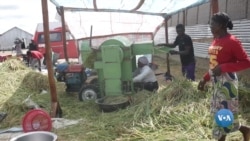ລັດຖະບານ ໄນຈີເຣຍ ກ່າວວ່າ ຕ້ອງການຍົກລະດັບພາບພົດຂອງຕົນໃນຖານະເປັນສູນກາງການສົ່ງອອກສິນຄ້າກະສິກຳ ໃນປີ 2025 ຜ່ານໂຄງການທີ່ຮ້ອງວ່າ “ Earn From The Soil ” ໂຄງການນີ້ຍັງເປັນຄວາມພະຍາຍາມທີ່ຈະຫຼຸດການເພິ່ງພາລາຍໄດ້ຈາກນໍ້າມັນຂອງປະເທດນໍາດ້ວຍ. ເອມິກາ ກິບສັນ ມີລາຍງານຈາກ ນະຄອນຫຼວງອາບູຈາ.
ໂມເຊສ ດີໂອໂກ ( Moses Diogo ) ພະນັກງານລັດຖະກອນບໍານານ ອາຍຸ 59 ປີ ໄດ້ເຮັດອາຊີບກະສິກຳ ເກືອບ 30 ປີ ໃນເນື້ອທີ່ 10 ເຮັກຕາຣຂອງລາວ ລາວປູກເຂົ້າ ໝາກຖົ່ວ ແລະ ຖົ່ວດິນ ລາວຫວັງທີ່ຈະຂະຫຍາຍຜົນຜະລິດພາຍໃຕ້ໂຄງການ "Earn From the Soil". ທ່ານ ດີໂອໂກ ກ່າວວ່າດ້ວຍເງິນປະມານ 2,000 ໂດລາ ລາວເຊື່ອວ່າ ລາວສາມາດເພີ້ມຜົນຜະລິດໄດ້ຢ່າງຫຼວງຫຼາຍ.
ໂມເຊສ ດີໂອໂກ ຊາວກະສິກອນຂະໜາດນ້ອຍກ່າວເປັນພາສາອັງກິດວ່າ “ ຖ້າຂ້ອຍສາມາດຫາເງິນໄດ້ສາມລ້ານແນຣາ (Naira) (ເທົ່າກັບປະມານ 1,990.23 ໂດລາສະຫະລັດ) ກໍ່ຈະຊ່ວຍໃຫ້ຂ້ອຍໄດ້ຫຼາຍກ່ວານີ້ ເພາະວ່າອ ປີທີ່ຜ່ານມາຂ້ອຍປູກຖົ່ວດິນປະມານສອງເຮັກຕາຣ ແຕ່ເທື່ອນີ້ ຂ້ອຍພາວະນາດ້ວຍຄຸນພິເສດຂອງພຣະເຈົ້າ ຢ່າງໜ້ອຍກໍ່ຈະໄດ້ປະມານ 4 ຫຼື 5 ເຮັກຕາຣ.”
ໂຄງການນີ້ໄດ້ຮັບທືນຈາກທະນາຄານກາງຂອງໄນຈີເຣຍ ໂດຍໄດ້ຈັດສັນງົບປະມານກ່ວາ 32 ລ້ານໂດລາສະຫະລັດ ສຳລັບເງິນກູ້ດອກເບ້ຍຕໍ່າໃຫ້ແກ່ຊາວກະສິກອນຂະໜາດນ້ອຍ ແຮງຈູງໃຈດ້ານພາສີ ແລະແຜນການທີ່ຈະສ້າງເຂດສົ່ງອອກເພີ້ມຕື່ມສຳລັບການເຂົ້າເຖິງຕະຫຼາດທົ່ວໂລກ ໂຄງການນີ້ແມ່ນເນັ້ນໜັກໃສ່ທີ່ການຂະຫຍາຍ ແລະ ການເຮັດກະສິກຳເພື່ອລ້ຽງຊີບ ໄປສູ່ການດຳເນີນການທາງດ້ານກະສິກຳຂະໜາດໃຫຍ່ ທີ່ເນັ້ນໃສ່ປູກພືດທີ່ມີມູນຄ່າສູງເຊັ່ນ ໂຄໂກ້ ງາ ໝາກມ່ວງຫິມະພານ ແລະ ຂິງ ເພື່ອການສົ່ງອອກ.
ທ່ານ ດີໂອໂກ ກ່າວວ່າ ເຖິງວ່າໂຄງການນີ້ ຈະເປັນໂຄງການທີ່ດີສຳລັບຊາວກະສິກອນ ແຕ່ລາວກໍ່ຍັງບໍ່ໄດ້ຮັບເງິນຊ່ວຍເຫຼືອ ຫຼືການສະໜັບສະໜູນໃຫ້ເງິນກູ້ຢືມຈາກລັດຖະບານ.
ທ່ານ ໂມເຊສ ດີໂອໂກ ຊາວກະສິກອນຂະໜາດນ້ອຍ ກ່າວເປັນພາສາອັງກິດຕື່ມວ່າ “ ຂ້ອຍໄດ້ພະຍາຍາມຫາທາງຢ່າງໜ້ອຍໃນຂັ້ນຕອນວິທີຂໍຮັບການສະໜັບສະໜູນນີ້. ແຕ່ຂ້ອຍກໍ່ໄດ້ພະຍາຍາມແລ້ວ. ທັງໝົດນີ້ ພິສູດແລ້ວວ່າ ບໍ່ສຳເລັດ ແຕ່ບາງຄັ້ງເມື່ອສິ່ງທີ່ເກີດຂຶ້ນ ເປັນເລື້ອງຍາກສຳລັບບາງຄົນ ສຳລັບພວກເຮົາເຖິງວ່າ ຈະມາເຖິງແລ້ວກໍຕາມ ຍັງມີບາງຄົນທີ່ໄດ້ຮັບການຄັດເລືອກມາຊຶ່ງໂດຍປົກກະຕິຈະບໍ່ຊ່ວຍຫຍັງ.”
ພາກກະສິກຳມີສ່ວນຮ່ວມສະໜັບສະໜູນປະມານ 22.6% ຕໍ່ ຜະລິດຕະພັນລວມພາຍໃນ ຫຼື GDP ໂດຍລວມຂອງ ໄນຈີເຣຍ ແລະ ເພີ້ມຂຶ້ນປະມານ 5.4% ຂອງການສົ່ງອອກທັງໝົດໃນໄຕມາດທີສອງຂອງປີ 2024 ຕາມຂໍ້ມູນຂອງຫ້ອງການສະຖິຕິແຫ່ງຊາດ. ທ່ານ ນາງ ບຣິດເຈັຕ ໂອກໂປໂກໂຣ ທີ່ປຶກສາທຸລະກິດກະສິກຳທີ່ມີຫ້ອງການຢູ່ໃນນະຄອນຫຼວງ ອາບູຈາ ກ່າວວ່າ ຍັງມີຊ່ອງທາງໃຫ້ເຕີບໃຫຍ່ໄດ້ ແຕ່ຕ້ອງແກ້ໄຂບັນຫາໂຄງສ້າງພື້ນຖານ.
ທ່ານ ນາງ ບຣິດເຈັຕ ໂອກໂປໂກໂຣ ທີ່ປຶກສາທຸລະກິດກະສິກຳ ກ່າວເປັນພາສາອັງກິດວ່າ “ເຮົາຈຳເປັນຕ້ອງເພີ້ມຄວາມອາດສາມາດໃນການຜະລິດຂອງເຮົາ ເຮົາບໍ່ສາມາດເຮັດຢ່າງນັ້ນໄດ້ໃນຕອນນີ້ ເນື່ອງຈາກຊາວກະສິກອນຂະໜາດນ້ອຍ ບໍ່ໄດ້ຮັບອຳນາດຫຼາຍພໍທີ່ຈະຮັບມືກັບຄວາມທ້າທາຍນີ້ ອີກເຫດຜົນນຶ່ງທີ່ເຮົາບໍ່ສາມາດສົ່ງອອກໄດ້ ກໍຄື ຂ້ອຍບໍ່ຄິດວ່າ ເຮົາຈະບັນລຸມາດຕະຖານໃນການສົ່ງອອກໄປຕ່າງປະເທດ.”
ທ່ານ ນາງ ໂອກໂປໂກໂຣ ກ່າວວ່າ ນະໂຍບາຍແລະການຝຶກອົບຮົມທີ່ເນັ້ນໃສ່ເປົ້າໝາຍໄປທີ່ການສົ່ງເສີມສັກກາຍະພາບຂອງຊາວກະສິກອນຂະໜາດນ້ອຍແລະສອດຄ່ອງກັບເປົ້າໝາຍການສົ່ງອອກຂອງໄນຈີເຣຍ.
ທ່ານ ນາງ ບຣິດເຈັຕ ໂອກໂປໂກໂຣ ກ່າວເປັນພາສາອັງກິດຕື່ມວ່າ “ ຖ້າລັດຖະບານສາມາດເຂົ້າມາ ຫຼືວ່າມີສ່ວນຮ່ວມການລົງທຶນສາມາດເຂົ້າມາແລະສ້າງນະໂຍບາຍ ເຊັ່ນການຫຼຸດພາສີ ໃຫ້ສິ່ງຈູງໃຈທາງພາສີ ນະໂຍບາຍທີ່ຈະເຮັດໃຫ້ຊາວກະສິກອນທີ່ພ້ອມຈະສົ່ງອອກສິນຄ້າ ເຮັດໄດ້ງ່າຍຂຶ້ນ.”
ເພື່ອເຮັດໃຫ້ໄນຈີເຣຍບັນລຸເປົ້າໝາຍໃນປີ 2025 ໃນການເປັນຜູ້ສົ່ງອອກສິນຄ້າກະສິກຳຊັ້ນນໍາ ຜູ້ຊ່ຽວຊານກ່າວວ່າ ມັນຕ້ອງຫັນປ່ຽນຄວາມທະເຍີທະຍານໄປສູ່ການປະຕິບັດໂດຍການໃຫ້ການສຶກສາ ແລະກຽມເຄື່ອງມືທີ່ທັນສະໄໝ ແລະນະໂຍບາຍສະໜັບສະໜູນໃຫ້ກັບຊາວກະສິກອນ ຂະໜາດນ້ອຍ.
ອ່ານລາຍງານໃນພາສາອັງກິດ
The Nigerian government says it wants to raise its profile as a hub for agricultural exports in 2025 through what it’s calling the "Earn From the Soil" initiative. The program is also an attempt to reduce the nation’s dependence on oil revenue. Emeka Gibson has the report from the capital, Abuja, narrated by Anthony LaBruto.
Moses Diogo, a 59-year-old retired civil servant, has been farming for nearly 30 years. On his 10-hectare farm, he grows rice, beans, and peanuts. He hopes to expand production under the "Earn From the Soil" initiative. Diogo says with an equivalent of $2,000, he believes he could significantly increase his production.
((Moses Diogo, Small Farmer)) ((Male, in Broken English))
“If I am able to get three million Naira (About $1,990.23 USD), it will help me more. Because, last year, I planted about two hectares of groundnut but this time around I said by the special grace of God at least between 4 or 5.”
Funded by the Central Bank of Nigeria, the initiative has allocated over 32 million dollars for low-interest loans to smallholder farmers, tax incentives and plans to create more export zones for global market access. It is focusing on expanding subsistence farming into larger-scale agricultural operations focused on high-value crops like cocoa, sesame, cashew nuts and ginger for export.
Diogo says, while this is a good initiative for farmers, he's yet to access government grants or credit support.
((Moses Diogo, Small Farmer)) ((Male, in Broken English))
"I have tried in such a way that at least the procedure, how to get this support. But I tried. All of these proved abortive ... but at times when this thing comes, it is difficult for one, for some of us to meet up with the procedure, to know a person, to this and that, even though it comes, there are some selected ones that normally would not help."
Agriculture contributed about 22.6% to Nigeria's overall GDP and made up about 5.4% of its total exports in the second quarter of 2024, according to the National Bureau of Statistics. Abuja-based agribusiness consultant Bridget Okpokoro says there is room for growth, but infrastructure issues need to be addressed.
((Bridget Okpokoro, Agribusiness Consultant)) ((Female, in English))
“We need to increase our capacity of production. We are not able to do that yet because ... the smallholder farmers are not empowered enough to be able to take on this challenge ... Another reason why we cannot export is that ... I don't think we're meeting the standards of exporting outside the country."
Okpokoro says targeted policies and training to empower smallholder farmers and align with Nigeria’s export goals.
((Bridget Okpokoro, Agricultural Economist)) ((Female, in English))
“If government can come in, or that stakeholders can come in and create policies ... for example, tax reduction, tax incentives, policies that will make it easy for the farmers who are ready to export.”
For Nigeria to meet its 2025 goal of becoming a leading agricultural exporter, experts say it must turn ambition into action by educating and equipping smallholder farmers with modern tools and supportive policies.






ຟໍຣັມສະແດງຄວາມຄິດເຫັນ